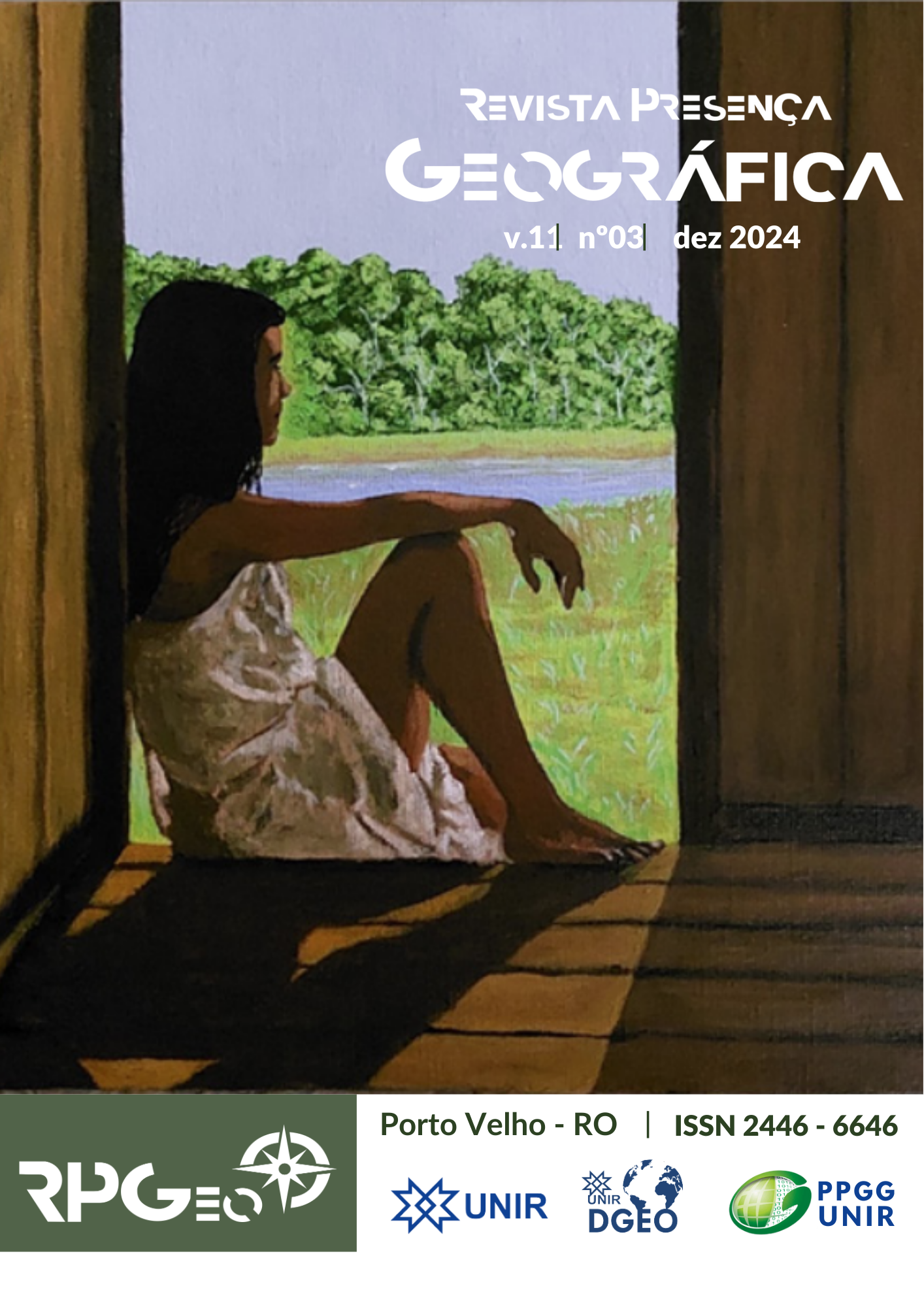INTERPRETANDO O SECTOR INFORMAL EM TEMPOS DA COVID-19 NO MERCADO MUNICIPAL DE MASSINGA EM MOÇAMBIQUE ATRAVÉS DA GEOGRAFIA DE COMÉRCIO E CONSUMO
DOI:
https://doi.org/10.36026/rpgeo.v11i3.8253Palavras-chave:
Comércio informal, Covid-19, Comerciantes, MercadoResumo
A pesquisa enquadra-se na geografia do comércio e do consumo, que pode ser formal ou informal. O sector informal em Moçambique ocupa 75% da população contribuindo para redução de desemprego, fome e pobreza por meio de geração da renda familiar. No município da Massinga a policia tem vindo a vigiar, perseguir e arrancar a mercadoria dos comerciantes informais, por vezes, espanca-os com a justificativa de que não pagam impostos e tornam os espaços municipais sujos. Esta pesquisa visou compreender os impactos do comércio informal em tempos da covid-19 no mercado Municipal de Massinga. Realizou-se um estudo qualiquatitativo com base na revisão bibliográfica, entrevista e observações de campo. Os resultados da pesquisa apontam que o comércio informal foi assolado pelo decreto Presidencial 11/2020 de 30 Março que estabeleceu o Estado de Emergência que limitava o número de pessoas por lugar geográfico, obrigava as pessoas a colocar mascaras, a higienizar constantemente as mãos e utensílios, assim como estabelecimento de horário obrigatório para término de actividades comerciais para 17h:30min. Tendo em conta o carácter do comércio formal, estas medidas obrigaram os comerciantes informais do município de Massinga a aceitaram passar a vender numa banca/barraca fixa atribuída pelas autoridades municipais e outros preferiram realizar o comércio remoto. Diametralmente, alguns comerciantes preferiram manter sua postura informal, chegando por vezes ao incumprimento das normas de prevenção, colocando suas vidas e dos outros em riscos de contaminação da pandemia do covid 19.
Referências
CORRÊA, R.L.O espaço urbano.4. ed. São Paulo: Ática, 2000.
BARATA, R. B. Como e porque as desigualdades sociais fazem mal à saúde. Rio de Janeiro: Fiocruz, 2012.
LEFEBVRE, H. A produção doespaço.Tradução do grupo “As (im) possibilidades do urbano na metrópole contemporânea, do Núcleo de Geografia Urbana da UFMG (do original: La production de l’ espace. 4. ed. Paris: Éditions Anthropos, 2000). Primeira versão: fev/2006.
MAPOSSE, A. H. S. (2011), “O papel do comércio informal na ocupação da força de Trabalho em Moçambique”.Dissertação de Mestrado em População e Desenvolvimento. Universidade Eduardo Mondlane. Maputo. 83pp.
MARCONI, M. D., & LAKATOS, E. M. (2010). Fundamentos da metodologia científica. 5º ed.: Atlas. São Paulo.
MINISTÉRIO da Saúde (BR). Guia de vigilância epidemiológica: emergência de saúde pública de importância nacional pela doença pelo coronavírus 2019. Brasília: Ministério da Saúde; 2020[acesso 21 abril 2020]. Disponível em: https://www.saude.gov.br/images/ pdf/2020/April/06/GuiaDeVigiEp-final.pdf
MOSCA, João (2010). Pobreza, Economia “Informal”, Informalidades e Desenvolvimento.Pobreza, Desigualdade e Vulnerabilidade em Moçambique.
RICHARDSON, Roberto Jarry (2010). Pesquisa Social: métodos e técnicas.3 Edição. Revista e Ampliada. São Paulo. Editora Atlas S.A.
SILVA, Patrícia Tonaco (2015). Qualidade de Vida Urbana e Mobilidade Urbana Sustentável na Cidade do Porto – Elaboração de um conjunto de indicadores.Faculdade de Engenharia da Universidade do Porto. Dissertação de Mestrado em Planeamento e Projecto Urbano.
SITOIE Carlitos luís (2020) Dinâmicas Socioambientais do Novo Coronavírus ( COVID-19) 1 ͣ. Edição.
SANTOS, M. A natureza do espaço:técnica e tempo, razão e emoção. 4. ed. São Paulo: Edusp, 2006. SANTOS, M.O espaço dividido: os dois circuitos da economia urbana dos países subdesenvolvidos. 2. ed. São Paulo: Editora da Universidade de São Paulo, 200
SITOIE, C.L., Dinâmica Sociambiental do Município de Massinga. Rede de estudos Ambientais de países da língua portuguesa (REALP). realp@uevora.pt, ISSN: ISSN 2183-749X, nº15, 2016.
SOUZA, M.L. Os conceitos fundamentais da pesquisa sócio-espacial. Rio de Janeiro: Bertrand Brasil, 2013.
Publicado
Edição
Seção
Licença
Copyright (c) 2024 Carlitos Luis Sitoie

Este trabalho está licenciado sob uma licença Creative Commons Attribution-NonCommercial-NoDerivatives 4.0 International License.
Este obra está licenciado com uma Licença Creative Commons Atribuição-NãoComercial-SemDerivações 4.0 Internacional.
Autores que publicam nesta revista concordam com os seguintes termos:
- Autores mantém os direitos autorais e concedem à revista o direito de primeira publicação, com o trabalho simultaneamente licenciado sob a Creative Commons Atribuição-NãoComercial-SemDerivações 4.0 Internacional que permite o compartilhamento do trabalho com reconhecimento da autoria e publicação inicial nesta revista.
- Autores têm autorização para assumir contratos adicionais separadamente, para distribuição não-exclusiva da versão do trabalho publicada nesta revista (ex.: publicar em repositório institucional ou como capítulo de livro), com reconhecimento de autoria e publicação inicial nesta revista.
- Autores têm permissão e são estimulados a publicar e distribuir seu trabalho online (ex.: em repositórios institucionais ou na sua página pessoal) a qualquer ponto antes ou durante o processo editorial, já que isso pode gerar alterações produtivas, bem como aumentar o impacto e a citação do trabalho publicado (Veja O Efeito do Acesso Livre).







